A Day in the Life
PowerMizzou.com had a chance to spend a day with Barry Odom and his new Mizzou coaching staff last week. We were afforded an all-access pass for a day, beginning with a morning workout, continuing through a weight room session, film study and staff meetings. Take a look behind the scenes as Missouri football enters a new era.
The football team starts its work before the sun does. It is 5:30 a.m. on this (unseasonably warm) 36-degree February morning and the stadium lights are the only thing to cut the darkness enveloping Faurot Field. By that time, some 100 players, all clad in identical gray Mizzou football sweatsuits--plus two to three dozen coaches and support staff--have already assembled on the field.
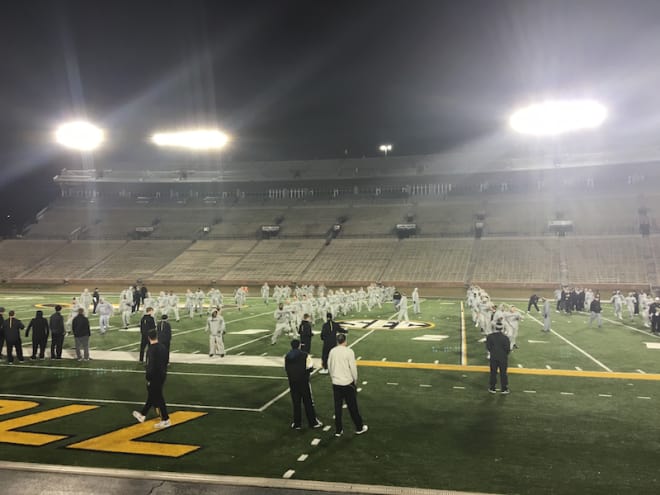
Barry Odom has been Missouri’s head coach for a little less than three months. He has assembled (and partially reassembled) a staff, rushed to cobble together a recruiting class and is now just days from the start of spring football. On this morning, the Tigers go through their ninth early morning team session. The NCAA allows each school eight hours of offseason work per week. Odom uses them by getting on the field at 5:30 every Monday, Wednesday and Friday and then affording each player a supervised hour in the weight room each day Monday through Friday.
The workouts are comprised of “doing everything you can without a football” according to Odom. You can’t use a ball, you can’t wear football equipment. There are individual drills and position drills. Part of this particular workout resembles a pre-game walkthrough. From the intensity of the coaches, an observer might forget there wasn’t a ball or that the players weren’t wearing uniforms or that there aren’t 70,000 fans in the stands on a September Saturday.
“You ain’t got nothing to do with that,” defensive coordinator DeMontie Cross hollers at a linebacker that has made a wrong move. “You’ve got to play the run first.”
Josh Heupel and Glen Elarbee supervise the offensive linemen running blocking schemes at half speed. Quarterbacks fine tune footwork and dropbacks. Skill position players run through agility drills.
Fifty-eight minutes later (you know this because Odom tells the players that’s how long it has been) the coach tells his team they’ve put in good work. He tells the players something that he repeats nearly every time he talks to anyone about Missouri football. The message is simple: “Get better today.”
“If we have 90% doing that and 10% not,” Odom says, “We don’t have a chance.”
The players break. They will hit the weight room, grab breakfast and go to class. The coaches head for their offices, or run home quickly before the day resumes. The workout is over. The work is just beginning.
“We’ve got one week to get as good as we can get,” Odom says.
It is just after 6:30 in the morning. The day is more than an hour old.
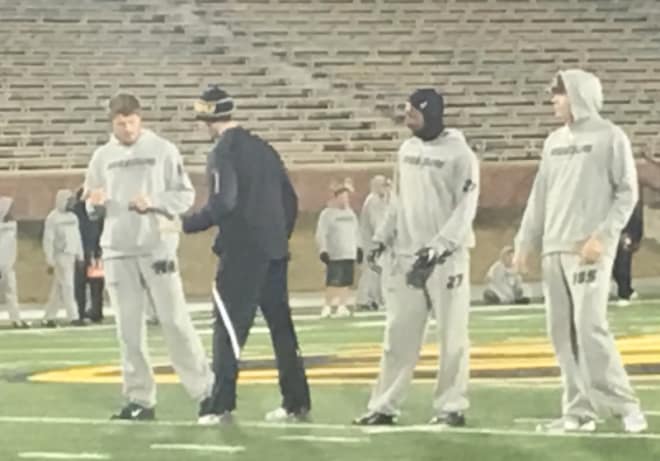
The group walks over the bridge spanning Providence Road to the Missouri Athletic Training Complex. Players head to the locker room to change. Some grab food from the dining hall before leaving to begin their day’s class schedule. A group of about 30 is the first to join strength and conditioning coach Rohrk Cutchlow in the weight room.
Cutchlow gathers the players around to explain the day’s agenda. Each station has laminated name sheets for two players. Below each name is a sheet where the player’s workout will be charted. Today begins with back squats, one of Cutchlow’s assistants demonstrating proper technique.
Cutchlow, like many others around the MATC, is new to this job, this program and these players. His routine, the way he wants things done, is still being established and must be explained. He is laying the foundation for “when we put big boy weight on.”
Cutchlow and three assistants are constantly pacing up and down the three rows of participants. The group includes veteran starters like Michael Scherer and Sean Culkin. It includes newcomers like Tyler Howell. It includes players looking to return to places they were a few months or a year ago in Terry Beckner Jr. and Harold Brantley. The coaches are on a constant swivel of encouragement and correction.
On the other side of the weight room, defensive line coach Jackie Shipp gets in a workout of his own. Offensive coordinator Josh Heupel walks up the stairs toward his office at 7:12. Less than ten minutes later running backs coach Cornell Ford and defensive coordinator DeMontie Cross head for their offices as well. Offensive line coach Glen Elarbee eats his breakfast at his desk, reviewing some old video on his computer. Other coaches, including Odom, have left the building, checking in at home, running a quick errand and getting ready for the work day.
Three graduate assistants are in the office, cutting that morning’s session into clips for Heupel and Cross to review with their respective assistants later in the day. At 7:55, Odom returns, having changed from his workout garb into khakis, a plaid shirt and a navy blue sweater. By 8:00, only four players remain in the weight room, lingering after their workout before beginning the school day.
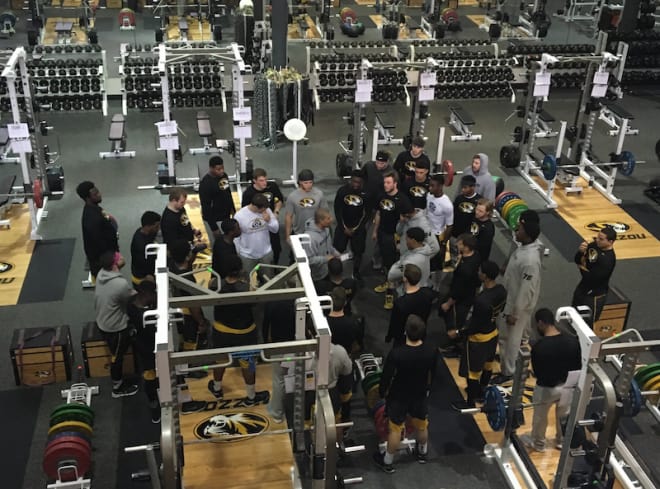
Cross is alone in the defensive meeting room. He is watching every rep of that morning’s walk through. He warns the two observers that enter the room, “You’re gonna hear a lot of (stuff) come out of my mouth.” He’s not lying.
For the next hour, Cross starts and stops at least three different angles of every rep from the workout. He goes through all eleven players, some silently, some out loud, waging an argument with himself about the positives and negatives of the smallest minutiae of every play.
“I just always look, did all the pieces work? If one piece is out of whack, then it didn’t work,” Cross said. “So that’s what I’m looking for. Rarely do you have all eleven pieces working together. We want to get to that and we’ll coach that every single play. We’ll make sure all eleven are doing their job. That will be a perfect play. And if not, then it’s not right.”
In some cases, exactly who each piece is can be tough to identify. The sweatsuits are all the same. The only numbers, on one leg of the sweatpants, are not visible on film. More than once, Cross asks a grad assistant who has entered the study session who a particular player is. Each play is either fantastic or terrible. Some are both at the same time.
“That’s a ten-yard play,” he says. “He’s got one job. Trying to do too much. They don’t have their eyes right. If they don’t have their eyes right, they can’t play.
The play is mentally marked as one to point out to the player at Cross’s next opportunity.
Then, later, “That’s exactly what we want it to look like.”
Another angle of the very same play: “That’s another touchdown.” On one play, he makes this proclamation after watching the left foot of a defensive back move. Neither the defender nor the receiver across from him is more than a yard from the line of scrimmage at the time.
There are positives as well. Of one player, Cross says, “Say what you want, he just keeps doing it right. I’m gonna make sure I tell him that too.” The GA observes, “That kid wants to play.”
Cross is not only analyzing players, but himself and his staff in how they are relaying calls, getting the players ready for each rep. At one point, he laments that he will “go back to being a GA” and draw up cards for each defensive set himself.
“I am not gonna be happy when we get together as a staff,” Cross says.
A few minutes later, “We’ll clean it up. This is all new for them. We’ll clean it up and I’ll coach them up.”
Asked about the constant back and forth with himself, Cross puts his head in his hands and laughs sheepishly.
“I’m wired that way. I think if it’s not right, then it’s a big play. As a defensive guy, you can’t allow big plays,” he says. “Even though I was in there griping a little bit at the tape, there were improvements. I just have a hard time seeing them because I know it can be better.”
At 8:49, co-defensive coordinator Ryan Walters comes into the staff room. The discussions continue--the good and the bad--for another few minutes.
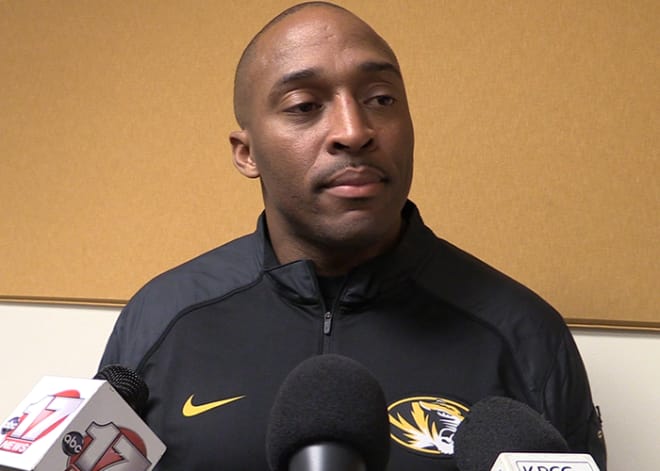
At 8:58, nearly everyone in the football offices has gathered in the offensive staff room. The nine assistant coaches and a few analysts occupy the chairs around a long table in the center of the room. Other staff and graduate assistants grab seats around the room up against the wall. A minute later, Odom enters the room, taking the seat at the head of the table to begin the daily full staff meeting. The clock over his right shoulder reads 8 days, 6 hours, 29 minutes and counting to the first practice of spring football.
Rex Sharp, the team’s head trainer, is the first to speak in the meeting. Every staff meeting begins with the medical report. At this time of year, it is generally not serious. An update on players rehabbing from surgery, one who sprained an ankle on the stairs in his apartment but should be fine in the next couple of days.
Sharp’s address lasts less than five minutes. He leaves the room to a round of applause after Odom mentions he recently celebrated his 30th wedding anniversary.
A white board is slid to the right. Behind it is another board, this one with nearly 100 color-coded magnets. Each magnet has a player’s name across it. This is the Missouri depth chart...at least as it stands at the beginning of the meeting.
The next twenty to thirty minutes consist of the coaches running through every player on that depth chart at every position. The position coach is asked for his thoughts on each player and each position. Should anyone move up or down based on what has happened since the last time the staff met? It is a daily discussion.
Odom, Andy Hill and Ryan Walters discuss potentially moving a player from wide receiver, where he is relatively low on the depth chart, to safety to help depth at the latter position. Hill says he will ask if the receiver would be interested later in the day.
Odom asks for updates on a couple of players dealing with personal situations. He makes sure a member of the staff will reach out to each of them following the meeting. On this day, there are no changes made to the depth chart.
“You want to make sure you’re stacking practices. You can’t be up and down. I don’t believe in rewarding the ups and downs,” Cross said. “We just don’t believe in a guy showing up one day and not showing up the rest of the days. Starter, backup, what have you. We’ll have a rotating depth chart with everything I have to do with. At the end of the day coach Odom will dictate it, but yeah, our guys are going to have to come prepared every day. If not, the depth chart will rotate.”
After the depth chart discussion, Odom turns his attention to spring practice. Odom learned at the feet of Gary Pinkel. The details are important.
“Organizationally, coach Pinkel had it down to a minute on exactly how things were going to go,” Odom said. “I’ve got practice one through 15, I’ve got the format and the drills, I’ve got those done.
“It will adjust a little bit as we go. I want to see how the first couple days go, the tempo of practice. Do we need to increase or decrease on the reps? But I’m pretty set on how many reps I want to get in the red zone, how many third and one, two or threes I want to get, how many certain situations that I want to cover.”
A question comes up about the tempo of practice. What will it be? “As fast as we can go,” Heupel says.
One of today’s topics is the practice plan format. Not what will happen at practice, though that’s a part of it. Odom has brought two layouts for the sheet he will give each coach the morning of practice. He wants feedback on which layout the staff prefers. These are the details.
“I want all the staff to feel like they’ve got some input to some of that stuff,” Odom said. “If there’s an opinion on the size of font for the practice plan, let’s talk about it and make sure that when we walk out of that staff room that we’re on the same page.”
Heupel liked one format. Cross liked the other. No consensus was reached. This topic may be revisited. Next, the staff went through how many reps each unit would get in both 7-on-7 and 11-on-11 periods in spring football and how various periods will be run. Some are set in stone, others are up for debate. After a few minutes, a consensus has been reached.
“I hope you look at, when people watch us work together as a staff, they’re going to think that we’ve been together more than a month,” Odom said. “It’s important when you build a staff, you want like-minded people. I don’t want a bunch of yes guys and I absolutely don’t have that, which is good.”
The staff was assembled from holdovers at Mizzou with additions from Baylor, TCU, Utah State, Arkansas State and Arizona State. It is a wide variety in geography and background, in age and experience.
“Whenever you get in that room and you really don’t know each other, there’s always that, ‘What’s this guy going to be about? What’s he like on a daily basis?’” Heupel said. “A lot of questions. It’s really been a lot of fun to be a part of this group because everybody’s highly competitive. Not very many egos and in this profession, that doesn’t happen very often.”
“It starts with the head coach and we’ve just got to support his vision of what he wants, what he wants to see and to me that’s the easy part with us,” Cross adds. “We know what direction we want to head in and we all just do our part to make sure we stay aligned. Things get unaligned, that’s when you start to have issues. I think our guys have really done a good job of sticking to the script.”
Odom wraps up by informing the staff they will meet to discuss the previous weekend’s junior day and tweaks that need to be made at 7 a.m. the following day. At nine, the coaches will meet to learn how to use a new system for logging recruiting calls and contacts. His final reminder is one that can sometimes get lost: “Academically, don’t let up on them.”

As the staff breaks up, Odom attends to various chores. These include interviewing a candidate for one of the vacancies created the week before when he relieved his Director of Operations and Director of Recruiting of their positions.
“I think as we restructure some things within our organization, from the top down, I’m always trying to evaluate the right fit for our current team and the right fit for our organization. It’s ongoing,” he said. “The volume of numbers, if you have more numbers, it doesn’t make you better. I’m a believer in having the right person in the right fit in the right role to serve our student-athletes.”
His assistant has practice plans laminated and ready to be cut. A shipment comes in from Office Depot. The offensive and defensive staffs have split up, to review that morning’s film independently.
Heupel is surrounded by his four full-time assistants--Andy Hill (wide receivers), Cornell Ford (running backs), Glen Elarbee (offensive line) and Joe Jon Finley (tight ends)--as well as four offensive analysts and graduate assistants. Before they can review film, there is recruiting to be done.
“Recruiting is what it is. It’s a grind,” Heupel said. “Year one’s tough because you’re trying to push forward to the next class, but you’re recruiting the previous class as well when we got here and you’re starting from scratch instead of having basically a calendar year leading up to that.”
He organizes a calendar. Each day, a different coach will bring the names of a handful of recruits to the meeting. Every coach in the meeting will write each of those prospects a handwritten note on a Mizzou football card. Today, the staff pens notes to five offensive targets who were in attendance at Junior Day. Forty-five letters are done and in envelopes in about 15 minutes.
That done, Heupel cues up the clips of that morning’s workout that have been cut up for him in the last three hours. As Cross did earlier in the morning, Heupel re-racks each play multiple times and the staff watches from multiple angles.
On one early play, Heupel compliments an offensive lineman. Elarbee laughs. They cue the play up again. The lineman did not touch his defender, but got in his way just long enough to re-route him and buy the quarterback enough time to simulate a pass (remember, there is no football).
“He didn’t get his hands on him, but it’s a win to me,” Heupel said. “You’ve got to know where to get beat.”
Each coach has a voice in this meeting. They are focused mostly on their own position, offering up criticisms and praise in about equal portions. The consensus: “They’re getting more and more comfortable with it every day.”
Missouri is installing a brand new offense. Not only will the tempo increase, but the plays and the terminology will change. Even the veterans are now rookies. Coaches too. Much of the meeting is discussing each position’s responsibility on each play and even the signals coaches will use to send plays in from the sideline.
“We’re not carrying over what they did,” Heupel said. “Terminology’s different. Some concepts may carry over, there’s a lot that won’t. There’s a lot of learning. At the end of the day, if everybody’s going to get on the same page, we’ve got to spend time together.”
The offensive and defensive meetings last more than 90 minutes.
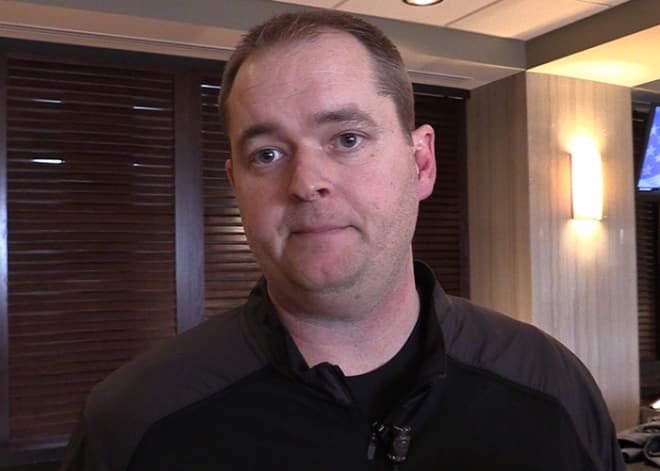
The end of meetings brings the staff to the lunch hour. Offensive and defensive meetings will continue throughout the day. Heupel and Cross use part of the noon hour to talk about the ideal way to distribute reps in spring practice among their respective units.
Odom stops one of his assistants to check on one of the previously mentioned personal situations for the third time that day. Some coaches step out, others are in their offices over the lunch hour. For Odom--like any first year head coach--budgeting his time is one of the challenges of his new job.
“I think maybe it will change a little bit once spring practice starts, maybe not as much travel. I know that’s part of it,” he said. “That’s important, especially first-time head coach, new staff. I get it. I want to do it. I embrace that part of it. There’s also a time in meeting time and on the field that it’s time to coach ball. I do find myself, that is still my favorite part of the day, being around the student-athletes.”
A few players stop by to swing through the dining hall. The next group isn’t due in the weight room until three o’clock. For Odom, spending as much time as he can with the players is the number one priority. It even impacts the way he set up his office.
There are the usual trinkets of a career in football. A commemorative ball from Pinkel after his school record 102nd victory. A trophy as the Tiger Quarterback Club’s 1999 Missouri most valuable player. But there is also a docking station for mobile devices and a video game console.
“Coach Pinkel did a great job; you hear the word family a lot when you talk to guys about the way he did things. That’s not an easy thing to establish. I want our players to feel comfortable around us,” he said. “That’s why I’ve got video gaming systems set up in my office. You can plug in your iPad or your iPod, whatever your choice is, you play your music. I want guys to feel comfortable coming in here, not that it’s always bad news when you’re going to see the head coach. That’s the most important thing is people.”
Odom brags that he is undefeated in his video game career since taking over as head coach.
“Never finished a game,” he says as he exits his office, off to another appointment.
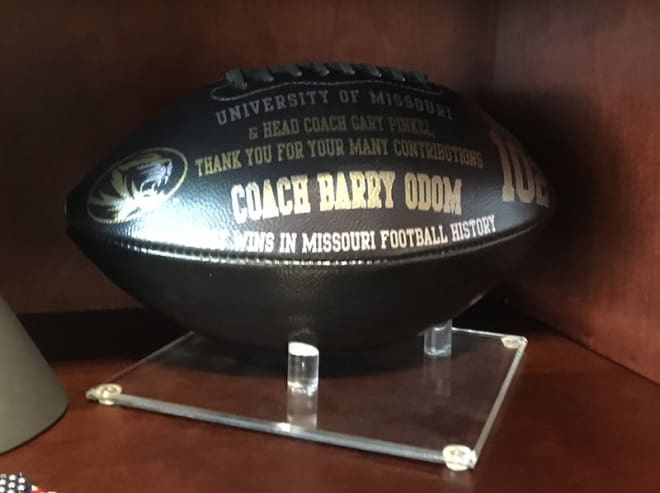
Part of being a head coach is having your hand in everything. Odom goes back and forth between offensive and defensive meetings. He will take some of the special teams responsibilities upon himself.
“I am gonna be more active in coaching a position and coaching on special teams,” he said. “That’s the way I feel like I need to do it.”
But he knows the need to delegate as well. A jack of all trades can become the master of none very easily. So he has told Heupel and Cross to approach their positions as if they are the head coaches of each side of the football.
“I think there’s a balance there. You want to make sure that coaches know they’ve got the opportunity to coach and they don’t have the head coach sitting there,” Odom said. “I think I’ve got enough of a relationship and a respect for both Heupel and Cross that they’re going to go do what I think they can do.”
That is, perhaps, a bit easier with Heupel. Odom’s background is on defense. He was a linebacker, then a safeties coach, then a defensive coordinator. Offensively, perhaps he will need to lean on his coordinator a bit more.
“Great coaches, I think, hire great people and then let them do what they need to do to be successful. You’ve got to trust them. Same time you’ve got to do a great job of setting the tone,” Heupel said. “Once that tone is set, he lets the coaches go out and coach their players and interact with them about football and he’s also very strong with having a relationship with them outside the game too. He’s done a great job of that. He knows that offensively, we have a style that we want to play and at the end of the day we’re going to put our kids in a position to be successful.”
Perhaps the biggest question since Odom’s hire has been how the defensive responsibilities will be delegated. Cross is the defensive coordinator and runs the meetings. Safeties coach Ryan Walters has assumed the title of co-defensive coordinator.
“He’s going to be abreast of everything we’re doing defensively,” Cross said. “We won’t do things or make moves without his knowledge of what we’re doing so we don’t get out of whack. But he’s basically told me, ‘You do what you need to do and if you need my input or if I have to have input, then I will. But other than that, it’s yours. You do what you need to do.’”
“When it’s third down and one, I better have a pretty good idea of what we’re going to run on offense,” Odom said. “It’s third and one, I’m gonna have some ideas on what I think defensively. Same thing with the opening kickoff at West Virginia what I want to do on kickoff coverage and kickoff return. There’s a million different ways to do it. What worked for Gary Pinkel is a little bit different from what would work for me.”
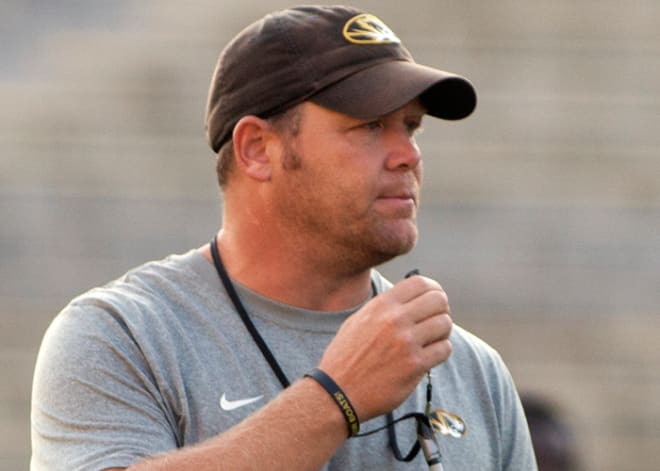
I left the football facilities a little after 1 o’clock. It was about eight hours after I’d arrived, but far from a full day. The staff will remain in the offices for a few more hours. How long they stay just depends on the day.
“I take pride in getting done what needs to get done to make us get better today,” Odom said. “If that’s all day and all night then I’ll do it. If it’s efficiently, you can get done and feel comfortable about it and you can go sleep at night and feel like you’ve done all that you can do, then I don’t want to sit around my office just to say I was there. That doesn’t make sense to me.”
It is a business defined by long hours. The burnout factor is high. At times, some coaches seem to almost take pride in the fact that they haven’t slept, or if they did, it was in their office.
“I don’t take pride in that,” Heupel says. “I don’t think any of our coaches do and I don’t want to work for a guy that does.”
Odom’s two older boys (he and his wife recently had a third child) come to the facility when they can. Heupel’s children, who will turn six and eight this week, stop by when they’re able. The same is true for the families of some of the other coaches. Cross’ wife is from Kansas City and has visited family quite a bit since their return to Missouri while her husband burns the candle at both ends.
“When she has been in town, I’ve had to force myself out of the office a little bit to make sure we’re able to spend time alone,” Cross said. “Everything has a balance and I know I can’t be all ball. But when she’s gone, I try to be as much ball as I can.”
“You don’t see your family a lot right now. That’s the give of it,” Heupel said. “Might be 15 to 20 minutes at the end of the day where you might get a chance to talk to them when you’re not on the phone with somebody else. To me, at this point where the staff is and how new it is, there’s a lot of give in that area. You buy time wherever you can with those kids.”
There is more give in year one than there will be in following years. College football is a round-the-clock, round-the-calendar profession. But a new coaching staff is responsible for building from the foundation up. In future seasons, there will be a base already in place.
“No matter what we do going forward, if we don’t get the foundation intact right now, it won’t work,” Cross said. “That starts, again, at the top. And Barry’s brand of football is we’re going to be tough.”
“It’s never easy, but it is different,” Heupel, who is in his first year at a program for the second year in a row, said. “You’ve been through the installation together, you’ve had the bumps in the road and you’ve found out who you are.”
Who is Missouri? Nobody knows quite yet. Not even Barry Odom. He’s eager to find out.
“I’m anxious for spring practice number one to get here just to see where we are,” Odom said. “The guys, they’ve worked extremely hard from when we started. That’s happening all over the country. They’re ready for spring practice to start, as are we. I don’t know. I’m ready to get practice one here. Then we’ll see where that is, try to get as good as we can get in practice number two.”
“What never really felt like forever to me, but felt like, okay, I got time, it was gone just like that,” Cross said. “Here we are less than ten days ready to go tee it up and get into spring ball.”
It is 8 o’clock. Driving down Providence Road, the lights in the offices inside the MATC are all off. This day is over. The next begins in fewer than 12 hours with a 7 a.m. recruiting meeting. Behind one of those closed doors, the countdown to spring football is at 7 days, 19 hours. Time is precious.
“There are going to be challenges. There are challenges every day,” Odom said. “If you get guys all thinking the same, working towards the same goal together, we’ll get where we want to go.”